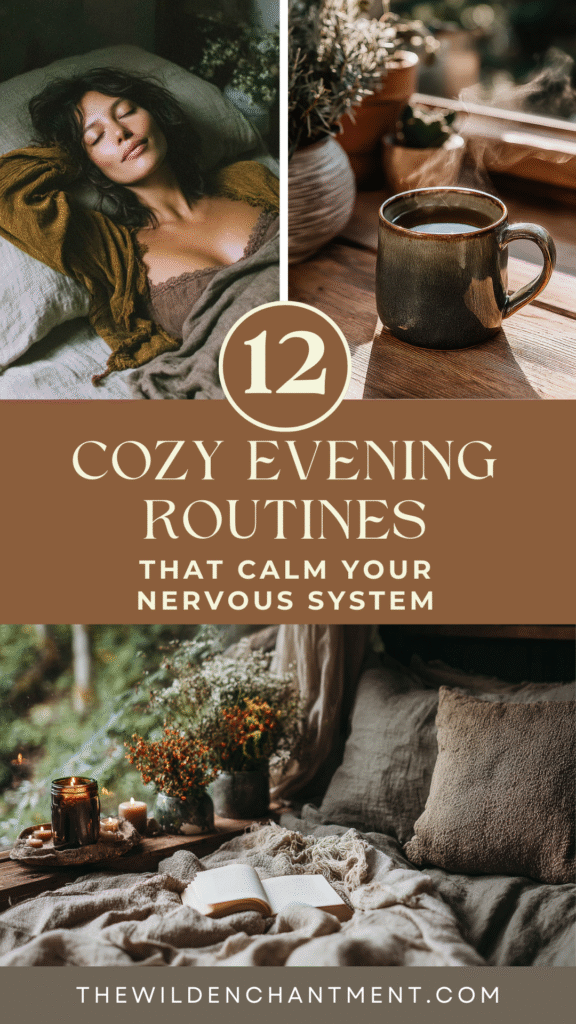This post may contain affiliate links, including those from Amazon Associates. If you make a purchase through these links, I may earn a commission at no additional cost to you. Learn more about our affiliate policy.
Evening has always carried a certain hush. As the light fades and the air cools, we’re invited to soften our pace and prepare for rest.
Yet for many of us, evenings are tangled with racing thoughts, endless scrolling, or the hum of unfinished tasks. Our nervous system, which longs to shift into a parasympathetic state of calm, often stays wired long past sunset.
Creating an evening rhythm that soothes your system is a gift not just to your sleep, but to your entire well-being.
A cozy, intentional routine signals to your body and mind that the day is complete and it’s safe to let go. If you’ve been craving gentler nights, here are ten calming practices to weave into your evenings.

Dim Lights and Create Soothing Ambience
One of the simplest ways to begin shifting into rest is through lighting.
Harsh overhead bulbs tell your body to stay alert, while warm, dimmed light cues your circadian rhythm that night is near.
Try turning off bright lights an hour before bed and instead use lamps, salt lights, or candles. The glow of beeswax or soy candles can feel almost ritualistic, transforming your space into a cocoon.
Consider pairing light with scents, like lavender or cedar incense, to signal even more strongly that you’re moving into a softer state.
Limit Screens and Digital Input
We all know the blue light of phones and laptops can interfere with sleep, but the mental noise is equally disruptive.
News updates, social feeds, and constant stimulation can keep your nervous system humming. Try creating a digital sunset—turning off screens at least an hour before bed.
Place your phone in another room or switch to airplane mode so you’re not tempted to check. Use that time for slower activities like tidying, preparing tomorrow’s clothes, or savoring tea.
The absence of screens can feel strangely spacious, giving your mind room to unwind.
Sip a Soothing Herbal Tea or Warm Drink

There’s something deeply calming about a warm mug in your hands.
Herbal teas like chamomile, lavender, or lemon balm are known for their relaxing properties. I love this Calm Tea from Anima Mundi.
You might also try golden milk with turmeric and cinnamon, or simply warm almond milk with honey.
The warmth itself helps lower your core body temperature afterwards, a natural cue for sleep. As you drink, let it be a small ritual and notice the steam rising, the scent of herbs, the way your shoulders release as you sip.
Gentle Movement and Stretching
Our bodies store tension throughout the day, especially in the shoulders, hips, and jaw.
Gentle stretching before bed can release what’s been held and create space for stillness. Simple poses like child’s pose, forward folds, or legs-up-the-wall are grounding.
If you prefer movement, a short yin or restorative yoga practice can work wonders.
Keep it slow and focused on breath rather than exertion. If you’re new to this, there are many short guided sessions available online that walk you through relaxing stretches meant specifically for sleep.
This 12-minute bedtime yoga practice from Yoga With Adrienne is a great place to start:
Breathing Practices and Relaxation Techniques
Breath is one of the most direct ways to influence your nervous system.
Techniques like diaphragmatic breathing, the 4-7-8 method, or simply lengthening your exhale all activate the parasympathetic “rest and digest” response.
Try sitting in meditation or lying on your back, placing a hand on your belly, and feeling it rise with each inhale and soften on the exhale.
Another option is progressive muscle relaxation, gently tensing and then releasing each muscle group from toes to head. Within minutes, your body can feel heavier, more grounded, ready to sink into sleep.
For more practices that help you feel rooted in small spaces, explore these grounding techniques for city living that ease overstimulation and restore balance.
Mindfulness, Meditation, or Visualization

Evenings can bring a flood of thoughts, especially when the day hasn’t offered much space to pause.
A short meditation practice helps redirect attention away from mental loops. You might listen to a ten-minute guided meditation or simply sit in silence, focusing on your breath.
Visualization can also be powerful: picture yourself in a peaceful meadow, hear the stream flowing, feel the grass beneath you.
Your brain responds to imagery almost as strongly as lived experience, giving your system a felt sense of safety and calm.
Take a Warm Bath or Shower
Water has an undeniable way of washing away the day. A warm bath with Epsom salts or herbs like chamomile and rose can relax sore muscles and quiet the mind.
If you don’t have time for a bath, a warm shower works as well. The shift in body temperature afterwards signals to your system that it’s time for sleep. Add candles, soft music, or a few drops of essential oils to create a sensory sanctuary.
This is one of those small practices that feels indulgent but actually supports both body and mind.
If you want your bathroom to work like a calm-down zone at night, these bathroom ideas for a nature therapy retreat show how to create a soothing, spa-like space at home.
Journaling or Setting Aside Worry Time

Writing is another way to clear space in your mind. Try setting aside five or ten minutes each evening to jot down any lingering thoughts, tasks, or worries.
Seeing them on paper allows your brain to release them, rather than carrying them into sleep.
If anxiety tends to strike at night, schedule “worry time” earlier in the evening: sit down with your journal, list your concerns, and then close it with the intent that you’ll revisit them tomorrow. Gratitude journaling can also be powerful.
Try writing three things you’re thankful for that day and notice how it reframes your perspective and softens tension.
Keep a Consistent Sleep Schedule and Bedtime Ritual
Our bodies thrive on rhythm. Going to bed and waking up at similar times anchors your circadian clock, making it easier to fall asleep and wake naturally.
Consistency trains your nervous system to expect rest at a certain hour. To support this, create small rituals that you repeat nightly: change into cozy pajamas, dim the lights, apply a nourishing moisturizer, or read a few pages of a book.
These cues become signals to your body that sleep is on the horizon, reducing the fight-against-bedtime feeling many of us experience.
Listen to Soothing Sounds or Music
Sound is another tool to shift state. Soft instrumental music, nature recordings like rain or ocean waves, or a white noise machine can help lull the nervous system into rest.
Many people find comfort in guided sleep stories or meditations that combine voice and soundscapes. Try experimenting, perhaps one evening you prefer rainfall, another night you enjoy quiet folk music.
Pair sound with dimmed light and a cup of tea, and your space becomes an invitation to exhale.
Final Reflections
Evening routines are not about perfection or elaborate schedules. They are about creating signals of safety and comfort for your nervous system.
Think of them as a love letter to your future self, one that whispers: you can rest now. Choose one or two practices from the list above and see how they shift your nights. Over time, these rituals become anchors, gently guiding you out of the whirl of the day and into the quiet of sleep.
There’s no need to do them all at once. Start small, stay curious, and let your evenings become a sanctuary. The calm you cultivate at night will ripple into your mornings, your work, your relationships, because when your nervous system is supported, your whole life softens into greater ease.


